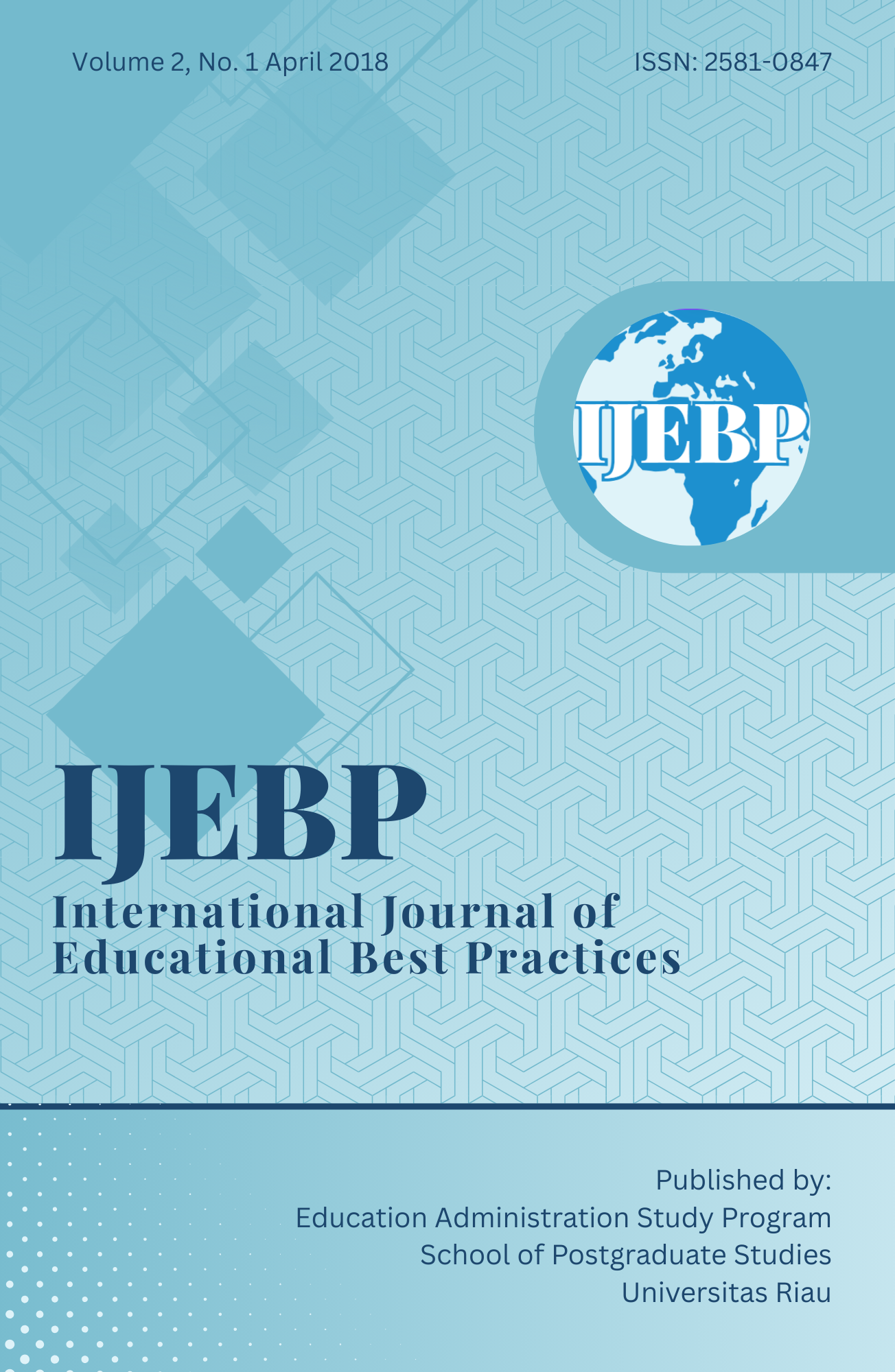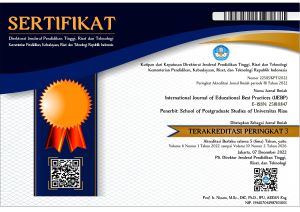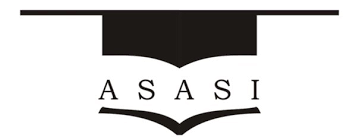AUTHENTIC TEACHING AND ASSESSMENT AS THE SOLUTION TO EDUCATIONAL EVALUATION IN REFERENCE TO ASEAN ECONOMIC COMMUNITY IN INDONESIA
DOI:
https://doi.org/10.31258/ijebp.2.1.26-38Keywords:
authentic teaching, assessement, ASEAN economic, communityAbstract
This paper is a monograph of an academic research paper entitled The Implementation of Classroom-Based Assessment within the English Secondary School Teachers in Riau Province-Indonesia (Universiti Kebangsaan Malaysia, 2012). Chronologically, it discloses such aspects as the changes of curriculum, the ignorance of productive skills, the functions of English in ASEAN economic community, the authentic teaching & learning, the authentic teaching materials, the authentic assessment, the related study, and the implications & recommendations.
References
Aka, E. & Guvendib, M. (2010).Assessment of the degree to which primary school teachers use alternative assessments and evaluation methods. Procedia Social and Behavioral Sciences, 2: 5599-5604. www.sciencedirect.com WCES 2010 (18.08.2011).
Alderson, J.C. & Clapham, C. (1995). Assessing student performance in the ESL classroom. TESOL Quarterly, 29: 184-187.
Ariev, R. P. (2005). A theoretical model for the authentic assessment of teaching. PAREonline.net, 10 (2). ISSN 1531-714. http://PAREonline.net. (28.06.2007).
ASEAN Economic Bulletin Volume 20, Number 3, pp. 292-296 ISEAS Publishing 2003. https://muse.jhu.edu/article/387674/summary. (08.08. 2016).
Asia for Educators. (2009). Japan’s Modern History: An outline of the period. Postwar Japan 1945-1989. Afe. easia. Columbia. Edu.timelines/japan_modern
Authentic Education. https://www.authenticeducation.org. (30.01.2017).
Authentic Learning: An enlighted Road into the Real World. authentic learning.weebly.com (01.02.2017).
Authentic Learning: The Glossary of Education Reform. edglossary.org/authentic learning (01.02.2017).
Azri, A.H.R. & Rashdi, A.H.M. (2014). The effect of using authentic materials in teaching. International Journal of Scientific & Technology Research. Volume 3, issue 10, October 2014. ISSN 2271-8616. www.ijstr.org (08.02-2017).
Bashrin, D.S. Productive skills: Teaching beginners in English Medium School. Department of English and Humanities Brac University, Dhaka-Bangladesh. A final report . (2013).
Berardo, A.S. (2006). The Use of Authentic Materials in the Teaching of Reading. The reading matrix. Vol. 5, No. 2, September 2006. Authentic Learning. http://en.wikipedia.org (01.02.2017).
Birgin, O. & Baki, A. (2009). An investigation of primary school teachers’ proficiency perceptions about measurement and assessment methods: the case of Turkey. Procedia Social and Behavioral Sciences, 1: 681-685. www.sciencedirect.com (04.08.2011).Brown, H.D. 2004. Language assessment: Principles and classroom
practices. New York: Pearson Education Inc.
Brown, H.D. (2004). Language Assessment: Principles and classroom practices. New York: Pearson Education Inc.
Carroll, J.B. & Hall, J.P. (1985). Make your own language tests: A practical guide to writing language performance tests. New York: Pergamon Institute of English.
Chou, E. 4 creative ways to use authentic materials for teaching English. www.fluentu.com. (30.01. 2017).
Collins Cobuild Essential Dictionary. Glasgow: Williams Collins Sons. (1989).
Crooks, T. (2011). Assessment for learning in the accountability era: New Zealand. Studies in Educational Evaluation, 37 (2011): 71-77. ScienceDirect. www.elsevier.com/stueduc (20.7. 2009).
Daria. (2016). Everything you always wanted to know about...get. Monthly Archives: December 2016. authentic-teaching.com (30.01.2017).
Decree of Rector of Universitas Riau Number 68/J19/AK/2004 on 22 March 2004
Depdikbud. (1994). Pedoman khusus pengembangan silabus dan penilaian mata pelajaran Bahasa Inggris (specific guide for syllabus and English evaluation) . Jakarta: Direktorat Pendidikan Menengah Umum.
Depdiknas. (2004). Kurikulum 2004 SMA. Pedoman Khusus Pengembangan Silabus dan penilaian mata pelajaran Bahasa Inggris (Curriculum 2004 for SMA. specific guide for syllabus and English evaluation). Jakarta: Direktorat Pendidikan Menengah Umum.
Depdiknas. (2008). Rancangan penilaian Hasil Belajar (Learning achievement design). Dirjen Manajemen Pendidikan Dasar dan Menengah. Direktorat Pembinaan Sekolah Menengah Atas.
Dirjen Dikti. (2014). Penjelasan tentang Linearitas Ilmu (An explanation on linearity). Jakarta: Dirjen Dikti Kemendikbud.
ePutra Portal Maklumat Pendidikan. (2012). Peperiksaan Awam (National Exam). Kementerian Pelajaran Malaysia dan Majlis Peperiksaan Malaysia. (15.03.2017).
Fadly Azhar. (2000). Suatu studi tentang pelaksanaan pendekatan kebermaknaan (Meaningful Language Learning) berdasarkan Kurikulum 1994 di Sekolah Lanjutan Tingkat Atas (SLTA) Kota Pekanbaru (A study on the implementation of meaningful language learning based on curriculum 1994 at senior high school in Kota Pekanbaru). Jurnal Penelitian Media Informasi dan Komunikasi Ilmiah. Vol. IX. No. 2 Juli – Desember 2000 (72 – 81). Pekanbaru: Lembaga Penelitian Universitas Riau. ISSN 0825-0585.
Fadly Azhar. (2003). Peranan Pendekatan SLOWER dalam meningkatkan kemampuan menulis ilmiah mahasiswa Progam Studi Pendidikan Bahasa Inggris FKIP UNRI (The role of SLOWER approach to raise the scientific writing ability of English Dept Students of FKIP Universitas Riau. Jurnal VARIDIKA. Vol. 15. No. 2 Desember 2003 (86 -171). Surakarta: FKIP Universitas Muhammadiyah Surakarta. ISSN 0852-0976.
Fadly Azhar. (2004). Peranan Pendekatan Contextual Teaching and Learning dalam meningkatkasn kemampuan Bahasa Inggris Mahasiswa Jurusan Kebidanan Politeknik Kesehatan Pekanbaru (The role of Contextual Teaching and Learning in raising the English proficiency of Midwifery academy Pekanbaru students. Jurnal VARIDIKA. Vol. 16. No. 2 Desember 2004 (87 - 95).Surakarta: FKIP UniversitasMuhammadiyah Surakarta. ISSN 0852-0976.
Fadly Azhar. (2012). Pelaksanaan Penilaian Berasaskan Kelas dalam Kalangan Guru Bahasa Inggeris Sekolah menengah Pertama (SMP) Negeri di Provinsi RiauIndonesia (The implementation of classroom-based assessments within the secondary school English teachers in Riau Province-Indonesia). Disertasi Doktor
Falsafah. Universiti Kebangsaan Malaysia.
Fadly Azhar. (2013a). Content, Organization, and Language; A current, integrated rubric for the correction of writing skill. Proceeding. Pontianak: BKS Barat. ISBN: 978-602-7942-87-5.
Fadly Azhar. (2013b). Empowering performance assessment rubrics for oral communication skills. Proceeding. Annual seminar on english Language and Teaching. Padang: Universitas Negeri Padang. ISBN: 978-602-17017-1-3.
Fadly Azhar. (2014). Rancangan penilaian hasil belajar mata pelajaran Bahasa Inggris dalam Kurikulum 2013: satu penilaian (The design of English learning achievement evaluation and measurement). Dalam Mahdum, Wanhasmah Wanmamat, Zulfahmi (Editor). Pendidikan Holistik: tantangan dan masa depan. Pekanbaru: Badan penerbit universitas Riau. UR Press. ISBN: 978-979-792-547-5.
Fadly Azhar. (2015a). Developing English Teaching Materials, Tests and Assessments. A Practical Guide for English Language Teaching. Pekanbaru: UR Press. ISBN: 978-979-792-628-1.
Fadly Azhar. (2015b). Constructing rubrics for genres and short functional texts: A new challenge task for English language teachers. Proceeding in educational community and cultural diversity. 7th international seminar on regional education. Universitas Riau-Universiti Kebangsaan Malaysia. ISBN: 978-979-792-634-2.
Fadly Azhar. (2016a). Penilaian Otentik Pembelajaran Sejarah Lokal (Authentic assessment in the teaching of local history). Makalah disampaikan pada Workshop Guru Sejarah Tingkat SMA Seluruh Indonesia. Hotel Ibis Pekanbaru 20 – 22 July 2016.
Fadly Azhar. (2016b). Authentic teaching materials berbasis English for specific purposes dalam mengantisipasi masyarakat ekonomi ASEAN (ESP-based authentic teaching materials). Proceeding dalam Peranan Ristek dalam Meningkatkan daya saing sumber daya lokal. Universitas Pasir Pengaraian. ISBN: 978-602-74932-1-6.
Fadly Azhar. (2017a). Productive skills in authentic sources: a supporting language program to anticipate ASEAN economic community. Paper presented in International Conference on Science and Technology. Applied Science and Technology. Vol. 1. No. 1. 2017. http://WWW. Cstech.org.
Fadly Azhar. (2017b). Persepsi pengajar Bahasa Inggris terhadap pemberdayaan kompetensi Bahasa Inggris dalam rangka Ujian Nasional dan Masyarakat ekonomi ASEAN (English teachers’ perceptions on the empowerment of English competence in reference to National Exam and ASEAN Economic community).
Research Report. Pekanbaru: FKIP Universitas Riau-Indonesia.
Gansle, A.K. (2006). Elementary School Teachers’ Perceptions of Curriculum-based measures of written expression. PAREonline.net, 11(5) ISSN: 1531-7714 http://PARE online.net (17.08.2011).
Golkova, D., and Hubackova, S., Productive skills in second language learning. ScienceDirect. Procedia – Social and Behavioral Sciences 143 477–481 Elsevier Ltd. (http://creativecommons.org/licenses/by-nc-nd/3.0/). 2014. (01. 08.2016).
Hendriastuti, A. (2006). Penilaian Hasil Belajar. Modul pedoman penilaian di kelas (Learning achievement evaluation. (Module). Jakarta: Pusat Penilaian pendidikan Badan Penelitian dan Pengembangan Depdiknas.
Heitler, D. (2005). Teaching with Authentic Materials. www.intelligent-business.org © Pearson Education (01.02.2017).
Heitler, D. (2005). Teaching with Authentic Materials. www.intelligent-business.org © Pearson Education (01.02.2017).
Hughes. A. (2003). Testing for language Teachers. Second Edition. Cambridge: Cambridge University Press.
Hutchinson, C. & Young, M. (2011). Assessment for learning in the accountability era: Empirical evidence from Scotland. Studies in Educational Evaluation, 37: 62-70.
Integrate Ireland Language and Training The productive skills: speaking and writing as a second language. 2004. (31.05.2016).
Karimi, G. How do productive skills of L2 learning require emotional intelligence? (05.08.2016) from [email protected]
Kemendikbud. (2013). Materi Pelatihan Guru Implementasi Kurikulum 2013 (training module for teachers on the implementation of curriculum 2013). Jakarta: Kemendikbud.
Klenowski, V. (2011). Assessment for learning in the accountability era: Queensland, Australia. Studies in Educational Evaluation 37 (2011) 78 -83 ScienceDirtect www.elsevier.com/stueduc
Munoz, L. Productive skills. (englishonline.jimdo.com/productive-skill-teaching (25.07.2016).
Newmann, F.M. & Wehlage, G.G. (1993). Five standards of authentic instruction. Educational Leadership, 50 (7): 8-12.
Newsletter & Webinars. The four Characteristics of authentic Learning. Educational Research. www.ernweb.com (01.02.2017).
O’Maley, J.M. & Pierce, L.V. (1996). Authentic assessment for English language learner. Boston: Addison-Wesley Publishing Co. Oxford University Press, Tag Archives: productive skills. (2014). http://oupeltglobalblog.com/tag-productive skills (31.05.2016).
Petkovskaa, B. et al. (2010). Primary school education standards for student’s assessment in primary school. Procedia Social and Behavioral Sciences 2: 2366-2370. www.sciencedirect.com WCES-2010 (18.05.2011).
Perkins, D. (2016). Barriers to authentic teaching and learning. www.teachthought.com (31.01.2017).
Read, J. (2000). Assessing vocabulary. Cambridge: Cambridge University Press. Richards, et al. (1992). Longman Dictionary of Language Teaching and Applied Linguistics. England: Longman Group UK Limited.
Riau Pos, (2014). Kurikulum dari Masa ke Masa (curriculum from period to period). Pekanbaru: RiauPos, 20 Oktober 2014.
Segers, M. & Tillena, H. (2011). How do Dutch secondary teachers and students conceive the purposes od assessment? Studies in Educational Evolution, 37 (78-83) Sciencedirect. www.elsevier.com/stueduc (21.7.2011).
Sunardi & Imam Sujadi, (2016). Desain pembelajaran. Sumber belajar penunjang PLPG 2016 Materi Pedagogik BAB V (learning design. Learning resources for PLPG supporting program on Pedagogy Chapter 5). Jakarta: Direktorat Jendral Guru dan Tenaga Kependidikan – Kemendikbud.
Stufflebeam, D.L. (1971). The relevance of CIPP evaluation model for educational accountability. Journal of Research and Development in Education Fall: 19-25.
Tim Pustaka Yustisia. (2008). Panduan lengkap kurikulum tingkat satuan pendidikan (complete pathfinder for school-based curriculum). Yogyakarta: Pustaka Yustisia.
Tola, B. (2006). Penilaian Diri. Modul Pedoman penilaian di Kelas (Self/peer assessment. Module assessment in the classroom). Jakarta: Pusat Penilaian Pendidikan Badan Penelitian dan Pengembangan Departemen Pendidikan Nasional.
Urquhart, A. & Weir, C.J. (1998). Reading in a second language: Process, product and practice. Harlow: Addison Wesley Longman.
Weigle, S.C. (2002). Assessing writing. Cambridge: Cambridge University Press.
Weimer, M. (2012). Six Paths to more authentic Teaching. Faculty Focus. Higher ED Teaching strategies from Magna Publications. www.facultyfocus.com (01.02.2017).
Western & Northern Canadian Protocol for Collaboration in Education. (2006). Rethinking classroom assessment with purpose in mind. www.wncp.ca (08.07.2007).





